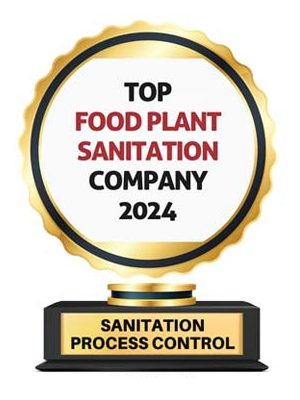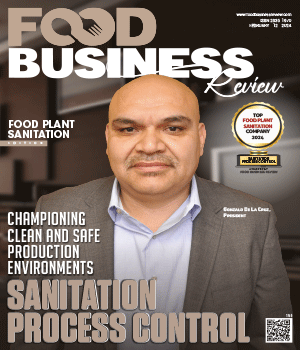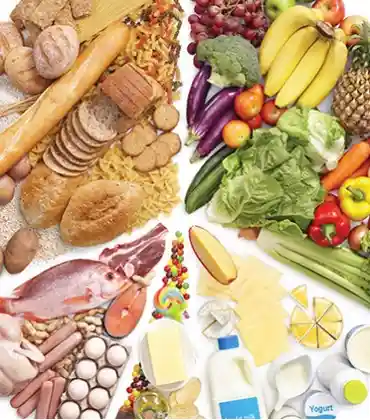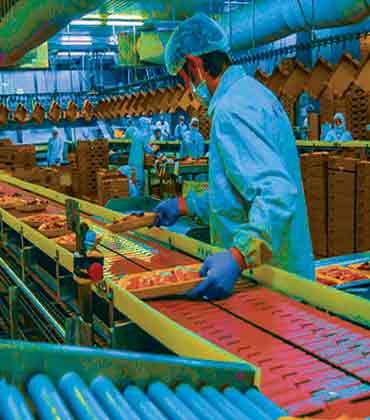Thank you for Subscribing to Food Business Review Weekly Brief
Sanitation is the first line of defense for any food manufacturer. They must implement food safety and sanitation measures to ensure that their processing plants remain audit-ready and compliant with stringent USDA regulations. However, despite their expertise in production and logistics, these plants often struggle with sanitation due to inadequate staff and the lack of strategic training programs. Lawsuits. Failed Audits. Food recalls. Injuries. These are the things which haunt food manufacturing companies. Sanitation Process Control (SPC) steps in as a reliable partner for this critical need, offering high-quality sanitation services designed for food processing plants. It leverages cutting-edge processes and techniques to develop and implement sanitation programs that align with food safety guidelines, ensuring total readiness for USDA audits and inspections. Companies can feel confident about maintaining residue-free processing lines at the start of each production shift. “We leverage over 30 years of diverse experience to provide continuous sanitation programs for our client’s ongoing success,” says Gonzalo De La Cruz, president at SPC. A One-Stop Ally for Everything Sanitation SPC began as a sanitation consultant for food manufacturers and has expanded its services to cover a diverse clientele, including meat and poultry plants, protein and fresh-cut produce suppliers, as well as processing units for greens, almonds, dairy, and other food products.[CIOS_QUOTES_REPLACE]Customer service excellence is at the core of SPC’s guiding standards. This excellence is achieved through a talented team of personnel who are rigorously trained in sanitation procedures. Fueled by their accountability, SPC delivers a carefully designed, 8-step process to boost its clients’ hygiene standards to new levels. The first and crucial step of sanitation is dry pickup. Acknowledging the nuanced demands of dry ingredient processes, SPC embraces a robust dry pickup process as a foundation for subsequent steps. The next stage involves the first rinse. In environments like a protein facility, using hot water during the first rinse proves indispensable, as it directly influences the nature of the sanitation procedure, distinguishing between a straightforward and complex process. SPC utilizes specialized equipment to set the optimal water temperature, pressure, and valve settings to efficiently eliminate debris from the processing area.
Transforming Traditional Waste Model
Many food and beverage (F&B) companies are accelerating sustainability efforts and transforming their business models in response to consumer demands for transparency into the health, environmental, and ethical considerations of the products they purchase. Committed to supplying naturally sourced, sustainably produced ingredients designed to support a healthy, well-balanced life, NURA emerges as a go-to supplier helping F&B businesses make a difference to the consumer and the planet. Its portfolio includes a wide range of products, like vegan proteins, various collagens, herbal extracts, natural sweeteners, prebiotics, and probiotics. The company also provides many Organic-certified, Non-GMO project-verified, and Glyphosate residue-free natural ingredients. Adding to the list are NURA’s Upcycled certified offerings, which include collagen and yeast protein. “We recognize that upcycled ingredients are gaining in awareness and interest in the marketplace; we go through the Upcycled™ Food Association for our upcycled ingredient offerings, ensuring the quality of our products through their rigorous approval process,” says Vanessa Hodges, Director of Strategic Partnerships at NURA. NURA works with vendors that use traditional waste materials in a recyclable or circular economic model. For example, it can upcycle cowhide for collagen, using different parts to make different grades of collagen for diverse consumer needs. This reduces the amount of cowhide ending up in landfills, resulting in a unique ingredient offering particularly interesting for pet applications.
Bringing a Sustainable Feast
The principles of regenerative agriculture and gastronomic delight intertwine in Capra Foods. This Texas-based company has mastered the art of raising Dorper lambs, known for their milder, tender, and delicate texture and flavor while following regenerative and sustainable rearing practices. “We responsibly raise Dorper lambs through cyclical grazing on open pastures and allow our consumers to trace their food’s origins. Our mission is to improve the world we inherited,” says Aaron Cook, Managing Partner of Capra Foods. The uniqueness of Capraa Foods lies in its focus on the Dorper breed. As a meat breed, Dorper sheep do not require shearing, which reduces stress on the lambs. Besides, the absence of lanolin results in superior quality meat known for its superior taste. Sustainability is a core area of focus for Capra Foods. Practices such as rotational grazing and pasture seeding reduce atmospheric carbon and enrich the soil, preserving and increasing the nutrient density of the plants. This supports diverse grazing seasons and fosters an underground microbial network for nutrient exchange and soil healing. Unlike monoculture pastures, this approach provides excellent grazing conditions for the animals. Capra Foods invests in customer training throughout the partnership. This approach ensures that its partners are equipped with the knowledge and resources necessary to succeed in promoting and selling their products. “We perform a lot of training for all our partners. By offering educational classes before introducing our products to new customers, we empower them with the knowledge and understanding needed to derive maximum value from our lamb offerings,” says Elizabeth Dressler, COO of Capra Foods.
CXO INSIGHTS

Building Foundational Elements for Sustainable Food Safety Management System
OlawumiWumiYusuff, Director, Food Safety at Ferrara

The Pro-Food Science Movement
Christopher Koetke, Corporate Executive Chef, Ajinomoto Health & Nutrition North America, Inc.

Impact of Sodium-based Food Preservatives
Sarah Engstrom, R&D Manager at Grande Custom Ingredients Group
IN FOCUS
Why Safety is an Important Component in the Meat Processing Industry
To realize the benefits of running a small meat processing company, it is essential to prioritize safety in every aspect of the operation
Food Safety Regulations/Standards Restaurants Must Incorporate
Food safety is a broad subject. Food handlers must exercise utmost caution from cultivating fresh products through processing,
EDITORIAL
Food Plant Sanitation: Ensuring Safety and Quality
One of the notable advancements lies in the integration of automation and robotics into sanitation processes. Automation not only streamlines cleaning procedures but also minimizes human error, thereby enhancing the overall efficacy of sanitation efforts. Robotics equipped with sensors and AI capabilities can navigate complex environments, reaching inaccessible areas, and executing thorough cleaning routines. This not only saves time but also ensures a higher standard of cleanliness, reducing the risk of contamination and foodborne illnesses.
Furthermore, the advent of antimicrobial coatings and materials has revolutionized food plant sanitation. These coatings, often containing compounds like silver ions or quaternary ammonium compounds, create surfaces that actively inhibit the growth of harmful microorganisms. By incorporating antimicrobial properties into equipment and infrastructure, food plants can maintain a more hygienic environment, mitigating the risk of cross-contamination and ensuring product integrity.
As we navigate an increasingly complex food supply chain, the importance of robust sanitation practices cannot be overstated. The latest advancements in food plant sanitation underscore a collective commitment to safeguarding public health and ensuring the integrity of our food supply. By embracing innovation, fostering a culture of hygiene, and prioritizing sustainability, the food industry is poised to meet the evolving challenges of sanitation head-on, ultimately delivering safer, higher-quality products to consumers worldwide.
In this edition, we have featured Sanitation Process Control. It leverages cutting-edge processes and techniques to develop and implement sanitation programs that align with food safety guidelines, ensuring total readiness for USDA audits and inspections. Companies can feel confident about maintaining residue-free processing lines at the start of each production shift.









